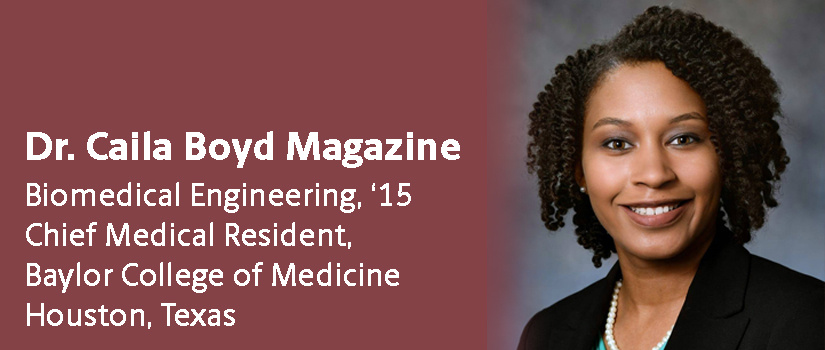Alumna Dr. Caila Boyd Magazine is utilizing her studies and experiences from the biomedical engineering program to a medical career. Shortly after graduating with a bachelor’s degree in biomedical engineering, in 2015, she began medical school at the Baylor College of Medicine in Houston, Texas. After serving as internal medicine-pediatric resident, she was named chief medical resident this past summer.
Dr. Magazine’s specialty is internal medicine in pediatrics. She is primarily interested in providing underserved primary care for individuals who lack healthcare access or serving at a federally qualified health center.
Why did you decide to study biomedical engineering?
“My original plan and was to attend medical school. But the advice my mother gave me was, ‘You want to go to medical school, and I have faith you'll get there. But what if that doesn't work out? What do you want to do next? What is something that you'll be interested in?’ Biomedical engineering was one of those interests because I like problem solving and putting things together. And a lot of medical issues coincide with biomedical engineering. It was a nice compromise of what I wanted to do and what I wanted to do if things didn’t go according to plan.”
Were there advantages to studying biomedical engineering before attending medical school?
“Yes, biomedical engineering pushed me more than my regular science courses would have if I had majored in biology or something similar. Out of all my courses, the engineering, calculus and differential equations courses pushed me to think and problem solve more and got me out of my comfort zone.
It prepared me for medical school and life in general and how hard it can be. Engineering taught me that even though I was in the top 10-to-20% in high school, I had to work harder to get there in college. Biomedical engineering pushed me to be more open to failures, things are not going to be perfect and that’s okay. It's about picking yourself up and keep moving on.”
Have you applied biomedical engineering principals and concepts to your career?
“Yes, I think an engineering mind is different compared to a physician. Having that background and problems solving skills is different compared to other degrees. But I can see aligning a biomedical engineering background and skills into medicine. How we think is similar when it comes to patient care.
One concept is body anatomy. I'm talking about different body systems such as kidneys and the heart. The heart was challenging for others, but I understood the concepts of what goes in and out, flow rates and other things. Sometimes an instructor would add an equation and that made sense to me. I can visualize it because of my engineering background, and it makes it helpful to understand why it [the heart] sounds higher or lower when you're listening on the stethoscope. You can't visualize it even in real time, so you have to either make a 3D model in your head or draw it out and hope for the best."
What do you enjoy most about your job?
"It’s my continuity clinic. There’s a clinic here at Baylor where, as a resident, you get your own patient panel. You inherit it from someone who graduated before you. Over four years, you follow these patients and develop a relationship with them. Now that I'm in my fourth year, I've been following these patients since my intern year. I've grown with them, and they have grown with me.
"It's rewarding when I can cry with them, hug them, and be excited to see them and they're excited to see me. But there’s also that bittersweet moment of saying, 'I just want to let you know that I'm leaving in eight months.’ And 50% of the time, they want to know where I'm going so they can follow me. That warms my heart to know that I have a relationship with enough patients that they would follow me to wherever I end up as a physician outside of residency. I love primary care and taking care of the whole person in general, whether it’s physical, mental or spiritual health.”
What advice would you give a biomedical engineering student who wants to follow a similar career path as you?
"Keep persevering through everything. It's not an easy road. I think the challenges that I faced were at the beginning with standardized testing and costs up front, but there are plenty of people that can help you. It's about persevering, and I think engineering teaches you that because you will have many failures when it comes to research projects. What can you do better next time? What can you leave now for the next class to finish? Failure is part of the journey, but it's not the end."
